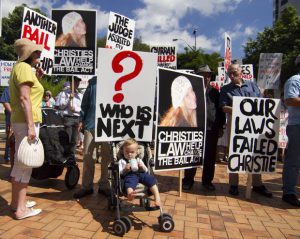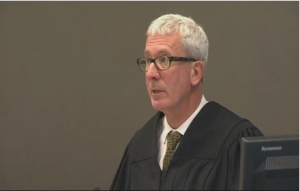In 2011, 18 year old Ashkay Chand stabbed Christie Marceau to death a month after being released on bail following a previous kidnapping incident. Garth McVicar and the Sensible Sentencing Trust claimed the judge got it wrong by letting him out and called for tougher bail laws to keep such people in prison on remand. In response to the ‘moral panic’ created by the SST, in 2013 the National Government passed The Bail Amendment Act. Four years later there are now an extra 1,500 people held on remand; we have a crisis in prison capacity and proposals are on the table to build yet another prison…

Here’s how it began…
Ashkay Chand was born in Fiji and had a troubled and unsettled childhood. His family moved to New Zealand when he was four, to Wales when he was eight, and then back to New Zealand a year later. At that point his parents separated.
As a teenager, Chand suffered from depression and was described as socially awkward. He met Christie Marceau at school but they later worked together at a local supermarket. Christie tried to help him with his emotional problems. Apparently, she was the only girl who had ever really been kind to him.
The kidnapping
On September 6, 2011 Ashkay invited Christie to his house. He threatened to stab her and made her undress down to her underwear, apparently intending to rape her. But for some reason, he changed his mind and allowed her to leave. However, Christie and her parents pressed charges and Chand was charged with kidnapping and threatening with a knife.
It was later revealed that Chand had been depressed since he was 13 and had been ‘hearing voices’ in his head. Once he was remanded in prison (prior to being released on bail), one particular voice became more insistent. It told him Marceau was the devil and that he should kill her, to get ‘reprisal’ for being rebuffed.
The murder
When he was interviewed by the police about the kidnapping, Chand told them he wanted revenge. Naturally, they opposed bail. But because of a series of communication failures within the court system described below, Chand was eventually bailed to his mother’s address not far from the Marceau family home. On 7 November 2011, he walked to Christie’s house, pushed past her mother who answered the door and stabbed Christie to death. After Christie’s mother called the police, apparently Chand just hung around listening to music on his iPod and waited for them to arrive.
The reaction – the Bail Amendment Act 2013

After the murder, the Sensible Sentencing Trust took advantage of the Marceau family’s grief, blamed the judge for her death and persuaded Christie’s parents to start a campaign to have the bail laws amended. A rally was held in Auckland in February, 2012 for people wanting to show their support for tougher bail laws. Garth McVicar even proposed that that Judges should be subject an annual appraisal of their performance.
In response to the media outrage that ensued, National passed the Bail Amendment Act making it much tougher for defendants to be granted bail. The new Act required those charged with certain crimes to prove they would safe on bail in the community rather than requiring police to prove they were dangerous and needed to be locked up while the court proceedings unfolded.
The Act was only intended to keep people charged with serious violent crimes from being bailed. Projections by the Ministry of Justice claimed the new Bill would increase the number of prisoners on remand by less than 60. However, the Ministry of Justice consistently underestimates the impact of new laws on the number of offenders who will be affected. In this case their projections were way off mark. Three years later, there were 1,500 additional prisoners on remand – exactly the same number as the capacity of the new prison planned for Waikeria.
The coroner came to a very different conclusion

In March 2018, seven years after the murder, the coroner Katharine Grieg, published a 127 page report examining what happened. She notes that prior to Chand’s release, there were five bail hearings involving two different judges.
In one of those hearings, on 9 September, 2011, Judge Morris asked that an “electronic monitoring” (EM) assessment be made urgently and made it clear that she did not consider that Mr Chand’s home address was suitable for bail because it was too close to the Marceau’s house.
According to the coroner, Judge Morris also made a handwritten direction which stated electronic bail was to be put in place. But the application for EM bail was never made. Chand subsequently appeared before Judge McNaughton on 23 September and 5 October 2011. The coroner concluded…
“On both occasions (the two court appearances before Judge McNaughton), the issue of EM bail was not raised by the police prosecutor or defence counsel, and Judge McNaughton did not have (access to) the transcribed notes of Judge Morris’s decision of 9 September.”
Inadequate risk assessments and the mis-diagnosis of Chand’s mental health issues
During the course of the bail hearings, Mr Chand was seen on 12 separate occasions by mental health professionals. Most of these interviews were conducted by mental health nurses who did not have the qualifications or experience that a psychiatrist would require. However, on 16 September, 2011, in accordance with an order made by Judge Morris, Mr Chand was assessed by consultant forensic psychiatrist, Dr Ian Goodwin who said:

“Mr Chand presents with symptoms of a mild to moderate depressive illness… There is no evidence of any psychotic process… Mr Chand does not in my opinion fulfil the criteria for mental disorder as outlined within the Mental Health (Compulsory Assessment and Treatment) Act 1992.” (para 64)
One of the issues raised by Dr Goodwin at the inquest was that he had very little information about Mr Chand when he conducted his assessment: Chand had no previous mental health history, no previous convictions, and no history of violence.
Dr Goodwin also pointed out that his report was not a risk assessment and he was not asked to consider whether or not Chand might re-offend against Christie. Given the nature of the offending, he thought Chand had ‘no hope’ of being bailed.
However, during the inquest, the coroner discovered that:
“Police had information that could have been useful to Dr Goodwin when he assessed Mr Chand. This information included Mr Chand ‘s evidential interview on 6 September; Christie’s interview with the police and a job sheet in which Detective Iremonger recorded Christie’s complaint on 6 September and which included things Christie reported Mr Chand had said while he held her at his house” (para 460).
Unfortunately, this information was not passed on to Dr Goodwin who said, if it had been, it would have helped him challenge statements that Mr Chand made when he interviewed him.
The final bail hearing 5 October, 2011
Mr Chand appeared in court for a fifth (and final) bail hearing on 5 October, 2011. Prior to this appearance, he was seen for 20 minutes by forensic court liaison nurse, Mr Robin Byrt. Mr Byrt advised the court in writing that Chand was doing well on antidepressant medication and said:
“Today there is no evidence of thought disorder or thought disorganisation in the defendant’s thinking and resultant speech. There are no psychotic features and no concerns from custodial staff.” (para 104)
The coroner’s conclusions

Coroner, Katherine Grieg, expressed no concerns whatsoever about the bail laws that were applicable at the time. On the contrary, she said Judge McNaughton’s decision to release Chand on bail was the result of communication failures by court staff and police who failed to pass on important information to the Judge from previous hearings with Judge Morris.
More specifically, the coroner noted:
1) Judge McNaughton was not informed and so was unaware that Chand lived a short distance from the Marceau’s house. He was also not aware that Judge Morris had already stated that Chand’s mother’s address was unsuitable as a bail address for this very reason.
2) Although Judge Morris ordered an application for electronic monitoring to be made, this was not carried out. Judge McNaughton was unaware that Judge Morris had even made this order.
3) The coroner was critical of the risk assessments conducted by the forensic mental health nurses who examined Chand and criticised them for their brevity. She went on to say:
“The assessment of Mr Chand’s risk to others undertaken by forensic court liaison nurses (FCLNs) did not meet the expected standard and, accordingly, the Court did not have robust information on these issues. The evidence at inquest confirmed that there was no dedicated systematic assessment of risk to others or any assessment of risk specifically in relation to Christie, and that risk statements were based almost entirely on Mr Chand’s self-reporting, which was not sufficient” (para 451).
What this all means

What this means is that Garth McVicar and the SST used Christie Marceau’s parents to misrepresent the entire situation and foist their simplistic solutions on the New Zealand public: and their solution is always the same – just lock up as many potential offenders as possible.
It also means:
- The legislation in place at the time about the granting of bail was not the problem.
- There was no need for the Government to pass the Bail Amendment Act.
- There is no need for 1,500 extra people to be held in prison on remand.
- If we repeal the Act, then there will be no need for a new prison – estimated to cost over $1 billion.
This taxpayer funding is possibly going to be wasted on a new prison, not because the bail laws needed amending, but because the National government gave into the moral hysteria created by McVicar and the SST. Cabinet Ministers allowed themselves to be manipulated into making an impulsive law change in response to a campaign driven by emotion and misinformation.
What the government should have done is wait for the coroner’s report on the case.
Its not too late to turn this around
It goes without saying that Coroner Grieg’s report is too late to stop Christie Marceau from being killed. It is also too late to stop Garth McVicar jumping on the bandwagon or to stop the Bail Amendment Act from being passed.
However, its not too late to let the new Government know we don’t need another prison. And its not too late to sign the petition.